PNP chief gen. Oscar Albayalde: Leadership by example

MANILA, Philippines — For Philippine National Police (PNP) chief General Oscar Albayalde, leadership should never be a complicated concept. His mantra, he says, is simple: lead by example.
Ever since he was young, and especially after assuming leadership posts in the country’s police force, Albayalde says his actions have always centered on that simple premise.
“Of all the principles of leadership, that one is what I have memorized: you have to lead by example,” he tells STARweek in Filipino.

PNP Chief Oscar Albayalde leads the gift giving of the Manila Police District mobile force library at the Paraiso ng Batang Maynila in Malate, Manila.
“That is the most important for me – you take responsibility as a commander. I will only ask them to do things that I would do. I won’t ask them to do those that I won’t be able to do,” he adds.
Often seen as strict and disciplinarian, Albayalde – known as Odie to his peers – says this principle is something that he wants all other law enforcers to emulate.
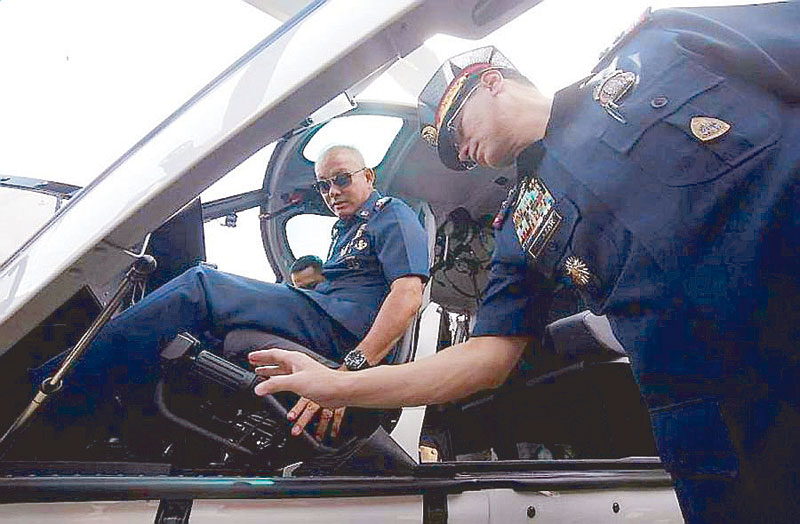
Albayalde leads the presentation and blessing of newly procured PNP equipment
“How would the public follow the police if there are those who break the law?” he asks. “Before disciplining others, we have to show them that we are also disciplined.”
Chosen by President Duterte to succeed now Senator Ronald dela Rosa, Albayalde has embarked on a campaign not everyone in the police force is fond of – internal cleansing.
After all, it was seen as a recognition that there is something wrong within the organization.
And there is, notes the PNP chief. “You to admit that there is a problem… How can we change that if we don’t recognize that there is something wrong?”
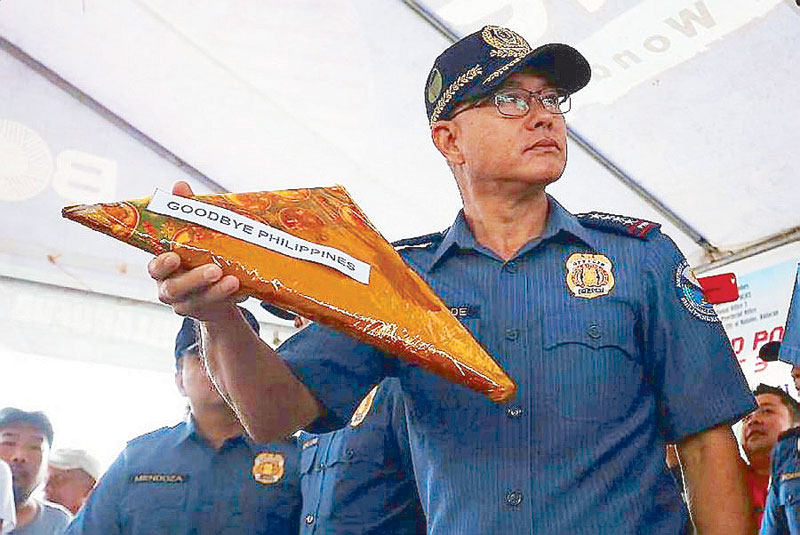
He holds an example of an illegal firecracker during an inspection in Bocaue, Bulacan
The PNP, when Albayalde assumed leadership in April 2018, was in the midst of criticisms over alleged human rights violations committed by the police in the implementation of the administration’s war against illegal drugs.
The year before, the police force drew stern condemnation over the murder of Kian delos Santos, who was seen on video being shot execution style by members of the Caloocan City police.
Albayalde, who at the time was head of the National Capital Region Police Office (NCRPO), sacked the entire Caloocan City police in the aftermath of the incident.
Looking back, he says that the incident indeed proved that there are bad eggs within their ranks. But the subsequent response, he says, also showed that they do not tolerate abuse as claimed by critics.
“There were abuses, but those abuses were addressed and they were not tolerated,” he insists, noting that those involved in Kian’s murder have been charged, tried and convicted.
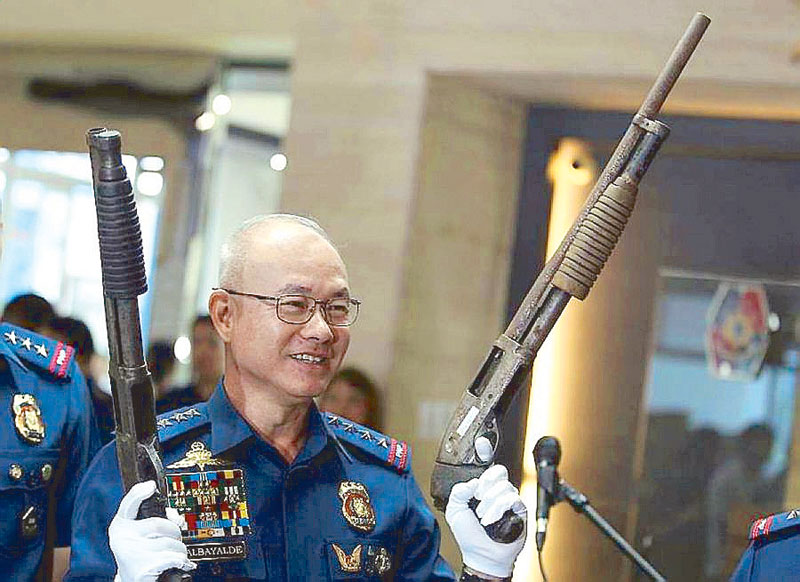
The PNP chief presents to the media shotguns seized during an operation
Internal cleansing, according to Albayalde, is important if they want the President’s anti-criminality and anti-illegal drugs agenda to succeed.
“If we give them slack, there’s a tendency that they would abuse their authority. And we don’t want that to happen,” he says. “You cannot abuse your position. That’s what we want them to keep in mind.”
Since becoming the PNP chief, he says many police officers have been relieved from their posts and investigated for their lapses and alleged abuse of authority.
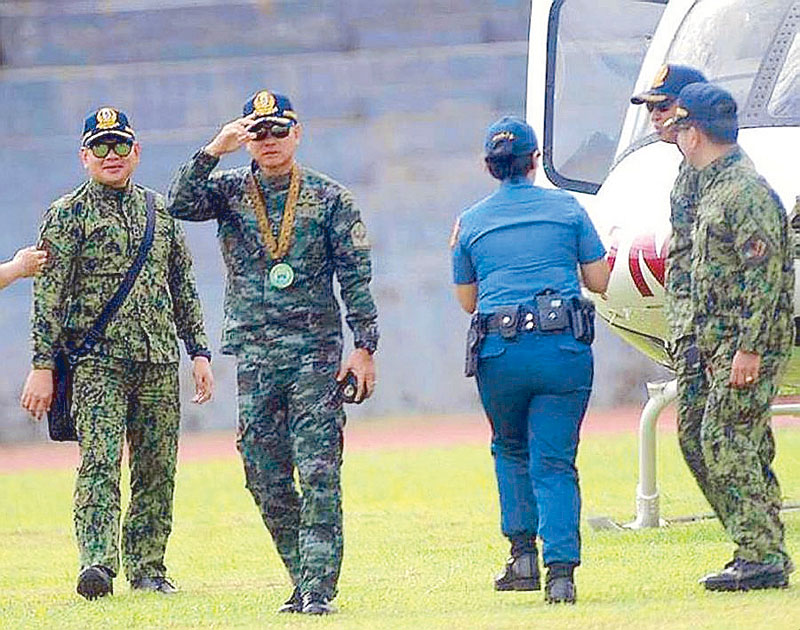
Albayalde arrives at the Mindanao Civic Center grounds en route to Tubod, Lanao del Norte
“Our police know that we are serious in this internal cleansing, internal discipline. They know that they will be relieved if they commit a mistake,” he sdds.
The initiative, however, is not limited to the punitive aspect.
More than disciplining those who commit mistakes, the PNP chief highlighted the importance of preventing them from doing so in the first place.
“That’s not just about punishments. Of course, if you do something wrong, then there will be punishments. But as much as possible we want to prevent that,” he says. “We have values formation… We try to mold these people to be God-fearing.”
Destiny
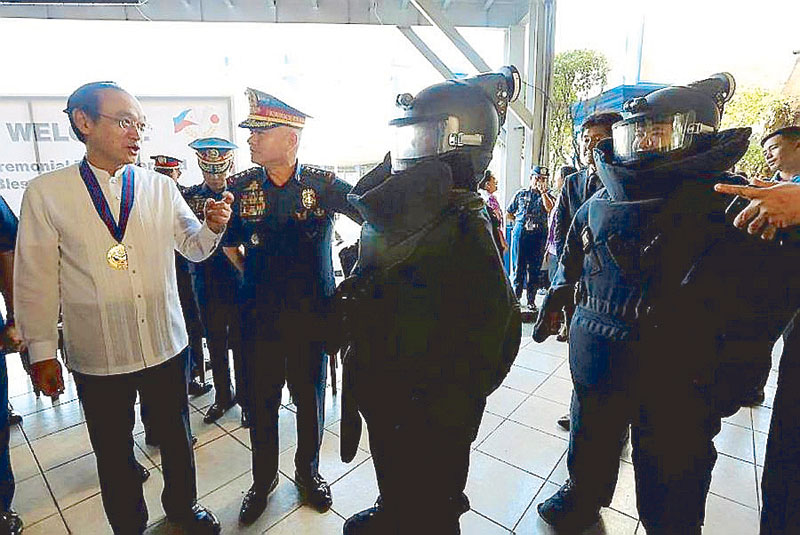
Ambassador of Japan to the Philippines Koji Haneda joins the PNP chief during the turnover ceremony of new bomb suits donated by the government of Japan
Born on Nov. 8, 1963 in Pampanga, Albayalde says being the PNP chief was not something he expected. In fact, when he was younger, it never even occurred to him that he would be a policeman.
“I wanted to be an engineer,” he says, explaining that – as a child from a poor family – he saw engineers as those who are affluent in life. “I was thinking of becoming a mechanical engineer.”
But his father, a retired soldier, had other plans for him.
“He told me, go to PMA – I didn’t even know what PMA is,” he recalls, referring to the Philippine Military Academy in Baguio. “I followed him and took the exams.”
He passed the written test. But to the dismay of his father, he failed the physicals. “I had some minor issues with my teeth.”
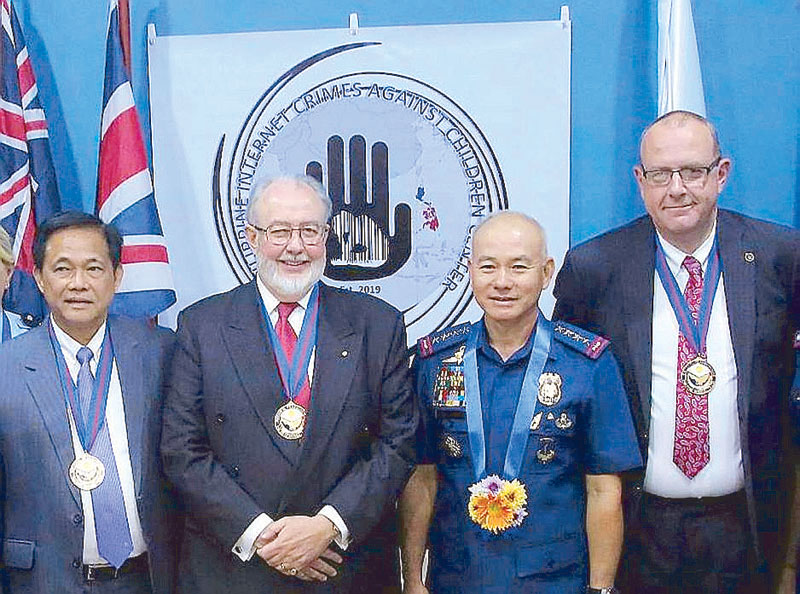
NBI Investigation Service deputy director Vicente de Guzman, Australian Ambassador Steven Robinson, Albayalde and Australian Federal Police assistant commissioner Debbie Platz at the inauguration of the Philippine Internet Crimes Against Children Center
With no money to support schooling in Metro Manila to take up mechanical engineering, the young Albayalde was constrained to enroll in a civil engineering program at a local college in Pampanga.
Later, however, he would give this up and try again – this time successfully – for a slot at PMA. A consistent achiever, he would graduate with honors as a member Sinagtala Class of 1986.
There were no regrets, he says when asked about his decision to let go of his dream to be an engineer. But if there is one thing that he would have wanted to change, it was his desire for his father, who died when he was in third year, to attend his graduation.
For Albayalde, being in the police force was his destiny, noting that an initial draw lots among their class landed him a slot at the Philippine Army.
But a later directive came ordering the reduction of those who will be assigned to the Army in favor of the Philippine Constabulary (PC), the precursor of the PNP. “I was then selected to be part of the PC.”
Being in the police force was not an easy task, says the PNP chief.
At some point, he reveals that he even considered leaving the organization altogether, citing internal issues and politicking.
In 2014, he was relieved from his post as Pampanga police director over alleged irregularities in an anti-illegal drug operation by his subordinates. Charges against him were later dismissed.
As it would turn out, Albayalde would bounce back to become the NCRPO chief and, later, the 22nd head of the country’s police force.
It was not something that he expected, he says, noting that he was never in the inner circle of the President. “It’s really one criteria that the President knows you personally that’s why I was not expecting.”
Asked what could have prompted the Chief Executive to name him to the plum post, he has a simple response: performance.
He cites his track record as NCRPO chief, recalling the surprise inspections he undertook to ensure that the police are doing their jobs.
He also trumpeted their successes in the government’s war on drugs, shrugging off criticisms that they tolerated and overlooked allegations of human rights violations.
“It is not true that we operated with impunity. There were also a lot of us who got hurt during police operations,” he says. “There are also those who were jailed.”
Strengths, limitations?
Fulfilling his mandate was challenging, especially following the footsteps of Dela Rosa, who had established himself as someone popular with the general public.
Albayalde says he wants to be known for his own style: mainly as a strict but reasonable commander who has commanded respect and at the same time initiated lasting reforms to cleanse the PNP ranks.
His experience as a field and intelligence agent was also helpful, noting that he was able to use this to ensure that those on the ground immediately address situations.
“After the Sulu (Cathedral) bombing, I immediately went there and monitored the operations,” he says, stressing the value of people seeing their highest-ranking officer on the ground. “I did not just relay my orders through a phone call.”
On the administrative aspect, the PNP chief admits that he has limitations as he had no previous experience in some of the responsibilities, such as bidding processes and finance.
To ensure that everything is above board, he says he asks trusted individuals to assess the processes and make sure that nothing is amiss. He also has a group of advisers who help him in some of the decisions he has to make.
Family man
Albayalde’s disciplinary nature continues even when he’s not in uniform
At home, he says his four children – three sons and a daughter – grew up under a strict father.
“I would order them to stand and talk to them one by one when someone commits a mistake,” he says. “When they would see me on television disciplining someone, they would keep on saying they have experienced the same thing.”
Unlike his father, however, he never asked his children to follow his footsteps to become police officers. His eldest son is now a pilot, while his twin sons are nurses. His daughter is in senior pilot.
Previously active in extreme sports such as sky diving, Albayalde says what his children got from him was his love for motorcycles.
“But I made sure that they got proper training,” he says.
As a husband, he describes himself as conservative, expressing support for the religious advocacies of his wife Cherrylyn.
Effecting change, the PNP chief admits, is not something that you achieve overnight. Cleansing the PNP ranks, for instance, may take years.
This is why it is important that his successor would be able to follow through with what he and his predecessor have started, says Albayalde, who is set for mandatory retirement at the age 56 in November.
“I hope that (my successor) would continue this internal cleansing. It’s really very important,” he says, stressing that this would further strengthen the trust of the public in the PNP. “They will feel more secure.”
The next PNP chief should also focus on the thrusts of the President, especially his promise to address criminality and illegal drugs.
“This is what he promised to our people so you cannot stray from that… Everything that you do should be geared towards the accomplishment of that mission,” he adds.
He declined to name a choice for his successor, saying the decision would be up to the President.
Asked how he wanted to be remembered as PNP chief, Albayalde says he hopes that his term would be seen as a turning point in strengthening public trust in the organization.
Ultimately, it is the public that will decide what his legacy will be.
Albayalde expresses excitement on his upcoming retirement, saying he wants to spend more time with his family.
But what if the President offers a government post?
His response is also a question: “Who am I to refuse an opportunity to further serve our people?”
For now, though, Albayalde vows to continue fulfilling his role as PNP chief with the same fervor since he assumed office.
“The war on drugs, we’ll continue that,” he says. “And of course, the internal cleansing.”
- Latest
- Trending

















